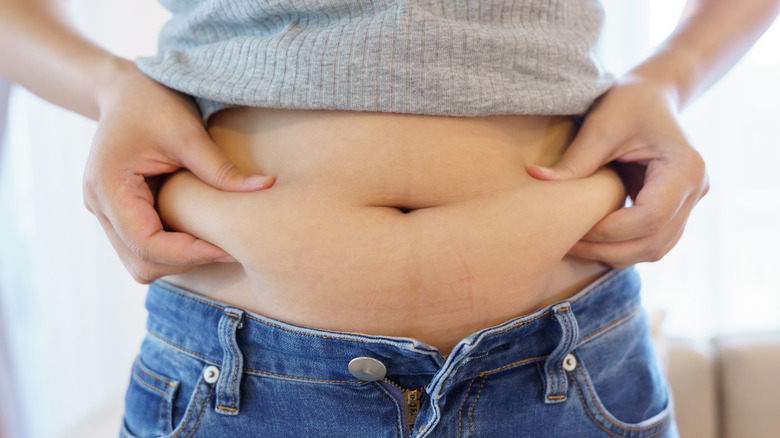Can You Get Rid Of Belly Fat Without Exercising?
Losing belly fat can be an ongoing struggle, especially for those who don't have time to exercise. A slow metabolism, stress, sleep deprivation, aging, and other factors only make things worse. For example, chronic stress promotes weight gain and visceral fat accumulation, according to research published in Current Obesity Reports. Visceral fat wraps around your liver and other internal organs, which can lead to insulin resistance, diabetes, heart disease, or even cancer, warns the Harvard Medical School.
Sleep deprivation plays a role, too. In one study, subjects who slept fewer than 6 hours per night experienced a greater increase in visceral fat than those sleeping 7-8 hours a night (via Obesity). Genetics, menopause, certain medications, and gut flora imbalances can lead to abdominal weight gain as well, per WebMD.
The Harvard Medical Schools recommends a balanced diet and regular exercise to get rid of belly fat. Strength training and moderate-intensity activities, such as cycling or brisk walking, are more effective than core work. Crunches, planks, and other abdominal exercises can build core strength, but they're not intense enough to burn fat and flatten your tummy. The question is, can you lose belly fat without working out?
Diet may be more important than exercise for weight loss
Belly fat can have a multitude of causes, including a sedentary lifestyle and poor nutrition. Unfortunately, exercise alone is not enough to help you get leaner. The only way to lose fat is to achieve a negative energy balance, or burn more calories than you take in, dietician Albert Matheny explained to Women's Health. To do that, it's necessary to exercise more, cut calories, or both. A pound of fat equals about 3,500 calories, so you have to burn an extra 7,000 calories to lose 2 pounds or 17,500 calories to drop 5 pounds. These numbers are not set in stone, but you can use them as a guideline when planning your meals.
Cutting calories doesn't have to be difficult. Simple habits, such as ditching sugar and swapping starches for veggies, can make all the difference. For example, a medium latte has about 200 calories (per My Food Data). If you drink one daily, that's an extra 6,000 calories per month. This means you could lose 1.7 pounds in 30 days simply by giving up your morning latte.
Physical activity can boost energy expenditure and lead to faster results, but you may also end up eating more. Working out increases appetite because your body needs to refuel after training, notes Aaptiv. "You can lose weight without exercise, but you cannot lose weight if your nutrition counteracts your energy expenditure through exercise," Matheny told Women's Health.
Change your lifestyle to lose belly fat and stay lean
Sometimes, diet alone isn't enough to reduce belly fat. You also need to address the root cause of your problem, whether it's stress, bad sleep, or an underlying condition. If, say, you normally go out for a drink after work, ditch this habit and see how your body reacts. "Everyone gains weight differently, and this is mainly a factor of genetics. However, high consumption of alcohol and refined sugar has been associated with increased abdominal adiposity, or visceral fat," dietician Whitney English explained in an interview with POPSUGAR.
Next, try to get more shut-eye, even if that means skipping your favorite late-night show. Sleep deprivation affects food preferences and appetite, according to a 2017 review published in the European Journal of Clinical Nutrition. Scientists found that people who didn't get enough rest ate more fat and less protein than the control group. What's more, their energy intake increased by about 385 calories per day, putting them at risk for weight gain.
Another beneficial habit you can adopt is taking probiotics or eating fermented foods, such as kimchi, natto, kefir, and sauerkraut. WebMD explains that probiotics balance the gut flora, which may help reduce belly fat. Clinical evidence indicates a strong link between gut microbiota composition and visceral fat mass, according to a 2019 review published in Scientific Reports. As the researchers note, gut bacteria may have a greater impact on metabolism and abdominal fat mass than diet alone.



